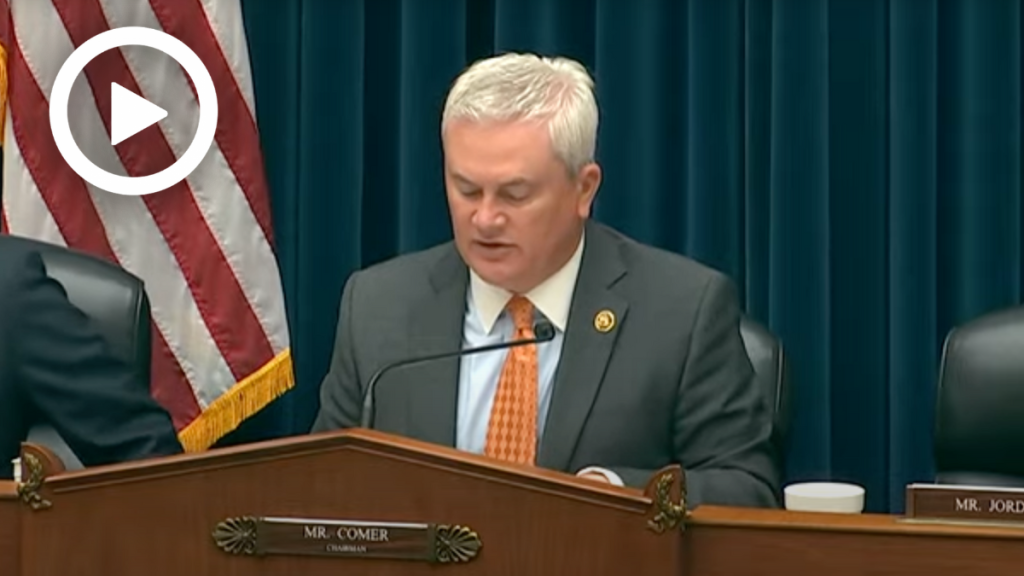Comer Opens Oversight Hearing on OMB’s Operations
WASHINGTON—House Committee on Oversight and Accountability Chairman James Comer (R-Ky.) delivered opening remarks at a full committee hearing titled “A Focus on Management: Oversight of the Office of Management and Budget.” In his opening statement, Chairman Comer emphasized the federal government exists to serve the American people and must be managed with their best interests in mind. He outlined how the mission of the Office of Management Budget (OMB) is to coordinate with federal agencies and execute the President’s priorities. However, he emphasized that OMB under President Biden has failed to prioritize effective, data-driven decisions that would benefit taxpayers. Chairman Comer concluded the Oversight Committee will continue to fulfill its responsibility to conduct oversight over OMB’s operations to ensure agencies are working together and our government is being well-managed.
Chairman Comer’s remarks as prepared for delivery appear below.
This morning, we’re here to review how the federal government is being run.
Government performance impacts all Americans in one way or another – whether it’s securing the border, issuing Social Security checks, or processing student financial aid forms.
The federal government is the nation’s largest employer, with a two-million strong civilian workforce headquartered here in Washington, D.C.
Each year, those employees administer nearly two-trillion dollars in grants and contracts. They operate and secure a vast network of federal information systems and perform myriad other functions to keep the government’s gears grinding.
Who’s in charge of this operation?
As much as any single individual, it is today’s witness, Jason Miller, the Deputy Director for Management at the White House Office of Management and Budget.
The management side of OMB – which Mr. Miller leads – devises and oversees the execution of the President’s Management Agenda. That’s the blueprint for how the President wants the government run – how to manage the workforce, the contracts, the IT, and the finances.
OMB works with individual federal agencies to ensure that vision is executed across the government.
The government exists to serve the American people, so it should always be managed with their best interest in mind. My constituents and those of the other members of this Committee want government services delivered efficiently and effectively. And they don’t want to pay for unnecessary overhead. I think we can all agree on that.
We can probably also agree that, to run efficiently, any large organization today must make data-driven decisions to ensure efficiency and cost-effectiveness.
And the Biden Administration claims to be using data-based management. But it’s not showing its work.
A prime example is employee telework.
At the onset of the COVID pandemic, massive federal employee telework was a justifiable necessity.
That necessity ended long ago. Yet, massive telework continues under the Biden Administration who is intent on making it a permanent fixture of federal work life.
How do we know this is in the best interest of the public? The only data we’ve seen on that is a survey of federal employees themselves. They think it’s working great.
And it came as a surprise to Committee members that, when the OPM Director appeared before us to testify last year, she was unable to answer basic questions about how many federal employees were going into their offices.
How can telework levels be data-driven if you don’t even know how many employees are teleworking?
Since that OPM hearing, we have been requesting telework-related information from agencies, including what evidence they possess that agency productivity is maximized by elevated levels of telework. In other words, how are Americans benefiting from federal employees staying home?
The collective responses were limited. They gave no assurance whatsoever that these policies are “data-driven” or otherwise designed with the best interest of the public in mind.
So, what is driving them?
Federal employee unions seem to be a major driver.
The fact is, the President himself said two years ago in his State of the Union address that federal workers would return to their offices. And the White House Chief of Staff has sent a few emails to agency heads prodding them to increase in-person work. But unions have continued to push back.
Half of recent union grievance cases before the Federal Service Impasses Panel dealt with telework or similar workplace issues like hoteling or shared workspaces in federal offices.
The Administration often speaks of “empowering” federal workers and their unions. And it has taken tangible steps to increase the strength of these unions.
Well, they seem to have some muscle. And it’s being flexed to resist the limited, belated attempts the Administration has made to get government employees back to work.
To be clear, it’s not just federal employee unions that the White House caters to in its management agenda. Unions operating in the private sector are also benefiting at the public’s expense. We see that in the way federal contract dollars are being managed.
For instance, the White House issued an executive order requiring federal contracting agencies to mandate Project Labor Agreements, or PLAs, on federal construction projects worth $35 million or more.
PLAs essentially require that union workers perform all labor on a project. This discriminates against the non-union majority of the construction workforce. And it drives up project costs to taxpayers by 12 to 20 percent. By one estimate, this PLA policy will impact at least 180 federal construction projects valued at $16 billion.
In December, OMB issued a memo concerning the PLA executive order. And our witness today, Mr. Miller, was among the White House officials who met last month with major union representatives at a roundtable on PLAs.
I am glad Mr. Miller is taking the time to meet with us today, to have this important discussion, where we can work together to ensure our government is being well-managed.
With that, I yield to the Ranking Member for his opening statement.
